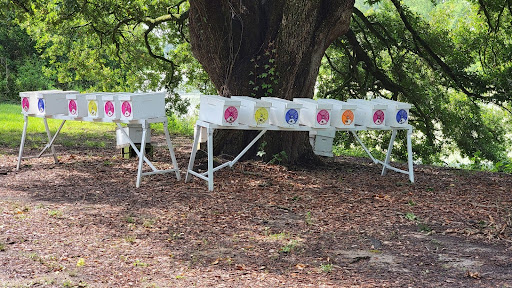Over Betterbee's 45 years of supporting beekeepers, we've established our credentials as a reliable source of high-quality beekeeping supplies. We've also built relationships throughout the bee-focused scientific community, because a big part of our philosophy is that we understand the cutting-edge science, and are participants in it whenever we can be.
Scientists at the USDA Baton Rouge Bee Lab reached out to our staff scientist Dr. Peck to see if Betterbee could support the lab's work. In the past, Betterbee had provided some extremely versatile nuc boxes to the lab, and they wanted to know if we could recreate those exact boxes so they could increase their supply and keep using them in their many experiments. We were happy to oblige, and built the custom boxes to the researcher's specifications.

These boxes are a modified version of our migratory nuc box, but the researchers wanted the convenience of our entrance disks to allow them the nucs to be opened, closed, or opened with queen excluders.
The lab had previously bought our migratory 5 frame nuc box with the Betterbee hive portal installed as the entrance. This product is not currently available but is a combination of our 5 frame migratory nuc box (with a traditional bottom entrance) as well as our hive portal. The rugged box is both economical and durable. By replacing the lower entrance with a midwall hole and the hive portal, the researchers can easily control traffic in and out of the boxes, and also seal the nuc for moving between research apiaries. There is great flexibility for nucs involved in research and queen rearing since the hive portal includes an open entrance setting, a sealed (but ventilated) moving setting, a queen excluder setting, and a drone excluder setting. The bright colors (chosen due to the wavelengths seen most easily by honey bees) also help to reduce worker drift.
Dr. Frank Rinkevich, a research entomologist at the Baton Rouge bee lab, and renowned expert on varroa mite resistance to the miticide amitraz, sent us an update on all of the exciting research these nuc boxes are being used for.
"Here at the USDA-Honey Bee Breeding, Genetics, and Physiology Lab, selective breeding is central to the science we do in service to beekeepers around the world. A long running breeding program at our lab has continues to develop and improve stocks of bees with Varroa-sensitive hygiene (VSH) that currently exist as the Pol-Line. Every spring, we raise approximately a thousand queens to maintain our breeding population, supply our own queens for field research projects, and share the genetics with collaborators for their own breeding efforts.
Raising and mating this number of queens requires reliable and durable equipment so we can focus on the project at hand. The standard nuc boxes that we require must be light, durable, and compatible with all our existing equipment. The rotating entrance screens make it easy to transport nucs between yards without any specialized tools or equipment.
While we produce a relatively large number of queens every year, even more queens are required for our future research program. Our lab received a USDA Areawide award to facilitate adoption of our research findings by beekeepers. The goals of this project are to:
1) Work with queen producers to identify colonies with VSH behavior so it can be used as breeding stock in their operation
2) Improve genomic tools for selective breeding of VSH in honey bees
3) Expand accessibility and speed of testing for amitraz resistance in Varroa with improved field test kits and enhanced genetic diagnostics
4) Perform an economic analysis of bees with VSH and the impacts of miticide use.
This large-scale project will involve many collaborators across the country utilizing thousands of queens we produce here in Baton Rouge. Delivering quality queens to meet the goals of this project is of utmost importance for us to successfully carry out our mission to reduce the impacts of Varroa by improving Varroa resistance in honey bees and extending the utility of miticides in an economically favorable manner."
It is Betterbee's pleasure to be able to support ongoing research and breeding programs trying to improve the lives of beekeepers everywhere. Our commitment to science isn't just limited to the classes we teach, but also to the products we make and our willingness to change our manufacturing plan to accommodate the needs of honey bee researchers.

